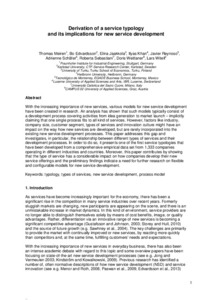Derivation of a service typology and its implication for new service development
Meiren Thomas; Edvardsson Bo; Jaakkola Elina; Khan Ilyas; Reynoso Javier; Schäfer Adrienne; Sebastiani Roberta; Weitlaner Doris; Witell Lars
https://urn.fi/URN:NBN:fi-fe2021042715208
Tiivistelmä
With the increasing importance of new services, various models for new service development have been created in research. An analysis has shown that such models typically consist of a development process covering activities from idea generation to market launch – implicitly claiming that one single process fits to all kind of services. However, factors like industry, company size, customer segment, types of services and innovation culture might have an impact on the way how new services are developed, but are rarely incorporated into the existing new service development processes. This paper addresses this gap and investigates, in particular, the relationship between different types of services and their development processes. In order to do so, it presents one of the first service typologies that have been developed from a comprehensive empirical data set from 1,333 companies operating in different industries and countries. Moreover, this paper contributes by showing that the type of service has a considerable impact on how companies develop their new service offerings and the preliminary findings indicate a need for further research on flexible and configurable models for new service development.
Kokoelmat
- Rinnakkaistallenteet [27094]
